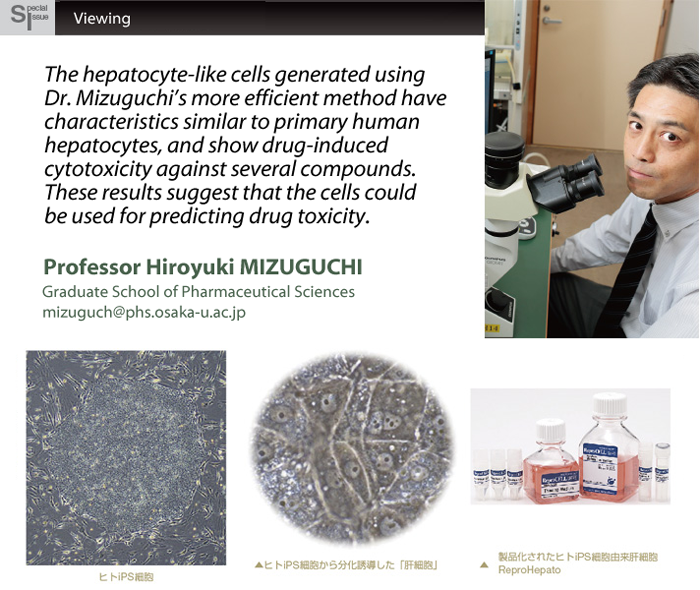
Functional hepatocyte-like cells differentiated from human embryonic stem cells (hESCs) and induced pluripotent stem cells (hiPSCs)
Towards the establishment of reliable toxicity evaluation systems
iPS cells are attracting attention not only in the field of regenerative medicine, but also in the field of drug discovery. MIZUGUCHI Hiroyuki, an Osaka University professor specializing in molecular biology, succeeded in generating iPS-derived hepatocytes for practical use in toxicity experiments in the drug discovery process. For his achievements, he was awarded the Ministry of Health, Labour and Welfare Ministry's
Tenth Conference for the Promotion Industry-Academia-Government Research Collaboration Award
and
3rd Prize
in the
German Innovation Award
,
Gottfried Wagener Prize 2012
.
Evaluating toxicity in human hepatocytes is essential in the development of new drugs
 The development of medicines requires long-term research and huge amounts of money. Moreover, drug hepatotoxicity is a major problem in this process. Therefore, the establishment of evaluation systems for testing hepatotoxicity is very important. Most drugs are metabolized by drug-metabolizing enzymes in the liver, but the metabolized compounds may have a level of toxicity. Evaluating toxicity in the human liver is necessary in order to examine the toxicity attributed to human metabolism. Professor Mizuguchi research centered on establishing evaluation systems for conducting such toxicity evaluation at a low cost.
The development of medicines requires long-term research and huge amounts of money. Moreover, drug hepatotoxicity is a major problem in this process. Therefore, the establishment of evaluation systems for testing hepatotoxicity is very important. Most drugs are metabolized by drug-metabolizing enzymes in the liver, but the metabolized compounds may have a level of toxicity. Evaluating toxicity in the human liver is necessary in order to examine the toxicity attributed to human metabolism. Professor Mizuguchi research centered on establishing evaluation systems for conducting such toxicity evaluation at a low cost.
iPS cells-derived human hepatocytes have enabled more accurate toxicity evaluation
Currently, many pharmaceutical companies conduct toxicity tests by using human primary hepatocyte cultures, but such cultures are limited in availability. Also, there are individual differences in drug-metabolizing enzymes in the human liver. Thus, it's difficult to do reproducible evaluation because the use of primary human cells suffer from batch variability. The decline of activation of drug-metabolizing enzymes in the culture is also a challenge. Professor Mizuguchi succeeded in making practical use of human iPS cell-derived hepatocytes. Their proliferation is possible virtually indefinitely; thus, a stable supply in large quantities is assured.
This enables researchers to conduct accurate toxicity evaluations at an early stage in drug development, enabling a drastic cut in time and money in the development of new drugs. Additionally, toxicity evaluation in conditions similar to those in vivo are possible, so making it possible to develop safer drugs.
Success in efficient generation of hepatocytes by gene transfer for drug toxicity screening
 Osaka University and the National Institute of Biomedical Innovation succeeded in developing efficient generation of iPS-derived hepatocytes by introducing genes necessary for cell differentiation in accordance with the differentiation stage by making use of gene transfer technology of improved adenoviral vectors that they had developed on their own. In order to improve this differentiation-inducing method, this group of researchers introduced FOXA2 and HNF1a, genes to promote differentiation. Human hepatocytes induced by this unique technology were produced in a joint development with bio venture companies. This world's first commercial human iPS cell-derived hepatocytes have been available since May 2012.
Osaka University and the National Institute of Biomedical Innovation succeeded in developing efficient generation of iPS-derived hepatocytes by introducing genes necessary for cell differentiation in accordance with the differentiation stage by making use of gene transfer technology of improved adenoviral vectors that they had developed on their own. In order to improve this differentiation-inducing method, this group of researchers introduced FOXA2 and HNF1a, genes to promote differentiation. Human hepatocytes induced by this unique technology were produced in a joint development with bio venture companies. This world's first commercial human iPS cell-derived hepatocytes have been available since May 2012.
This technology may clarify the pathophysiology of intractable diseases and the devleopment of therapeutic products
Professor Mizuguchi says, "There are few graduate schools of pharmaceutical sciences conducting iPS cells research. We are the leader of iPS cell research aiming at applications for drug discovery in the field of study of hepatocytes in Japan. We'd like to generate cells whose function is further closer to hepatic function in vivo."
"Our final goal is to create hepatocyte evaluation models with a variety of drug metabolic capacities and establish toxicity evaluation systems for examining toxicity in humans more accurately. As the next step, we are considering making use of iPS cells-derived hepatocytes as model cells for clarifying the pathology of diabetes, hepatitis C and B, and for developing therapeutic medicines for those conditions as well as of working on regenerative medicine together with the Graduate School of Medicine."
Adenovirus Vector technology has supported the practical application of iPS cells-derived hepatocytes
 Professor Mizuguchi is a researcher of adenovirus vectors. After obtaining a doctor's degree from Osaka University, he started research at the University of Washington. His development of technology for easily producing adenovirus vectors mediating efficient gene transfer was a world first. His production kits sell all over the world and are used in a variety of fields. He has since succeeded in highly efficient gene transfer following many improvements. The latest type of adenovirus vectors have acquired patents in Japan and the U.S.
Professor Mizuguchi is a researcher of adenovirus vectors. After obtaining a doctor's degree from Osaka University, he started research at the University of Washington. His development of technology for easily producing adenovirus vectors mediating efficient gene transfer was a world first. His production kits sell all over the world and are used in a variety of fields. He has since succeeded in highly efficient gene transfer following many improvements. The latest type of adenovirus vectors have acquired patents in Japan and the U.S.